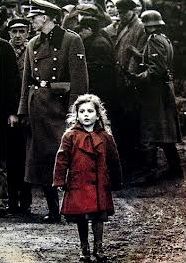 |
| The girl in the red coat. |
"It's Hebrew, it's from the Talmud. It says, "Whoever saves one life, saves the world entire.""
Steven Spielberg's Schindler's List is an incredible movie. It tells two true stories -the story of the Holocaust, and the story of an unlikely hero, Oskar Schindler.
The title refers to the list of approximately 1,100 Jewish people that Schindler saved by having them work in his factory to prevent them being sent to Auschwitz. He did this at great financial expense to himself, and risked his own safety if the German authorities figured out what he was up to.
In the beginning, he is simply out to make a buck. The Jewish workers are originally living in the Krakow Ghetto, and he can use them as cheap labor. It's a good deal for him, and his sole interest is in running a successful, money-making business. He is a charming guy, but desirous only of having a good time, drinking and womanizing, making connections within the German ranks, and ultimately, making money: "Three hundred and fifty workers on the factory floor with one purpose: to make money –for me!...They won't soon forget the name Schindler, either. I can tell you that. Oskar Schindler, they'll say. Everybody remembers him. He did something extraordinary. He did something no one else did. He came here with nothing, a suitcase, and built a bankrupt company into a major manufactory. And left with a steamer trunk, two steamer trunks, full of money. All the riches of the world." He doesn't want to be a hero, or to be involved in any cause other than his own.
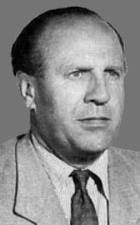 |
| The real Oskar Schindler. |
Regina Perlman: They say that no one dies here. They say your factory is a haven. They say you are good.
Schindler: Who says that?
Regina Perlman: Everyone. My name is Regina Perlman, not Elsa Krause. I've been living in Krakow on false papers since the ghetto massacre. My parents are in Plaszow. Their names are Chana and Jakob Perlman. They are older people. They're killing older people now in Plaszow. They bury them up in the forest. Look, I don't have any money. I –I borrowed these clothes, I'm begging you –please, please bring them here.
Schindler: I don't do that. You've been misled. I ask one thing: whether or not a worker has certain skills. That's what I ask and that's what I care about...such activities are illegal. You will not entrap me, Miss Krause. Cry and I'll have you arrested, I swear to God.
But in spite of what he says, Regina soon sees her parents safely moved to Schindler's factory.
Schindler's right-hand man is Itzhak Stern (Ben Kingsley), a Jewish accountant who does most of the running of the business and selection of the workers. Schindler is at first mortified to discover that Stern has hired an elderly, one-armed man (Stern simply replies, "Very useful!"), but when the Germans execute this man, Schindler is furious.
When Stern forgets his papers one day and is put on a train to be sent to Auschwitz (I think that's where they were sending him), Schindler races to the train to save him. The two German soldiers present arrogantly refuse to remove him from the train at first, but with great confidence, Schindler bluffs them into stopping the train and releasing him, by jotting down their names and saying, "Gentlemen, thank you very much. I think I can guarantee you, you'll both be in Southern Russia before the end of the month. Good day." After that, they are enormously helpful.
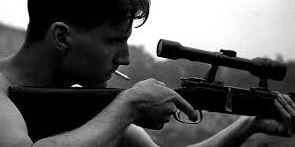 |
| Goeth shooting people from his balcony. |
Schindler goes out of his way to befriend the Goeth, the main villain of the story (of course there are many). Take the villain from Platoon (Sergeant Barnes) and set him loose with no one to check his bloodthirsty power, and you've got S.S. Lieutenant Amon Goeth, commandant of the Plaszow Concentration Camp in Poland, played by Ralph Fiennes (he plays a lot of different villains -Voldemort, the Toothfairy serial killer in Red Dragon). This guy is absolutely nuts and a true psychopath. When he first arrives, he maliciously orders the execution a young female engineer:
Reiter: The entire foundation has to be torn down and repoured. If not, there will be at least a subsidence at the southern end of the barracks. Subsidence, and then collapse.
Goeth: And you are an engineer?
Reiter: Yes. My name is Diana Reiter. I'm a graduate of Civil Engineering from the University of Milan.
Goeth: Ah, an educated Jew. Like Karl Marx himself. Unterscharfuehrer!
Hujar: Jawohl?
Goeth: Shoot her.
Reiter: Herr Kommandant! I'm only trying to do my job!
Goeth: Ja, I'm doing mine.
Hujar: Sir, she's foreman of construction.
Goeth: I'm not going to have arguments with these people. No. Shoot her here, on my authority.
Reiter: It will take more than that…
Goeth: I'm sure you're right. [Reiter is shot] Take it down, repour it, rebuild it, like she said.
 |
| Goeth and Helen. |
We see a lot of scenes showing the atrocities taking place within the camp -of people being hunted down and killed, of children hiding in the latrines to avoid being torn from their parents and sent to Auschwitz, of Goeth shooting people from his balcony just for fun. Haunting images.
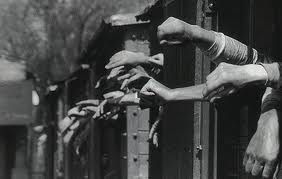
It is disheartening and infuriating how few people were willing to help, even in the smallest of ways. When a train packed with Jewish people is being sent to Auschwitz, so cramped that they have to stand up, and gasping because of the tight quarters and the terrible heat, reaching out the barred windows and crying for help, Schindler is the only person to do something. He requests that they use a hose to spray down the cars, providing them with some water and cooling them down. While he manages this effort, the soldiers just laugh at him, Goeth saying, "This is very cruel, Oskar. You're giving them hope. You shouldn't do that. That's cruel!" It's such a small mercy, and yet, the German soldiers think he's being ridiculous and a little annoying.
Eventually, the Plaszow Concentration Camp is shut down, and all the prisoners are to be sent to Auschwitz, including Schindler's workers.
After a period of inner turmoil, during which time Schindler is preparing to go home a wealthy man("I'm going home. I've done what I came here for. I've got more money than any man can spend in a lifetime."), he realizes that he can't abandon his workers to a horrible fate. He decides to open another factory and take his workers with him. He approaches Goeth with his proposition, and Goeth is puzzled:
Goeth: You want these people?
Schindler: These people, my people, I want my people.
Goeth: Who are you, Moses? Come on, what is this? Where's the money in this, where's the scam?...Look, you've got to move them, the equipment, everything to Czechoslovakia, pay for all that and build another camp. It doesn't make any sense...you're not telling me something...
Schindler: Look, all you have to do is tell me what it's worth to you. What's a person worth to you?
Goeth: No, no, no, no. What's one worth to you?
Schindler sets to work with Stern to make a list of "essential workers" for his factory. They work for hours, and Schindler continues to insist on more names. Finally, they have completed their list of 1,100 workers:
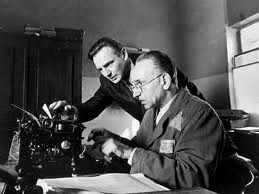 |
| Schindler and Stern making the list. |
Schindler: If you were still working for me, I'd expect you to talk me out of it. It's costing me a fortune. Finish the page and leave one space at the bottom.
Stern: The list is an absolute good. The list is life. All around its margins lies the gulf.
By this point, all of Schindler's desire for money seems to have left him. He is bleeding money to help save his workers.
There is one more person he wants to add to the list, and that is Goeth's maid, Helen, but Goeth won't hear of it:
Schindler: She's just going to Auschwitz...What difference does this make?
Goeth: She's not going to Auschwitz. I'd never do that to her. No, I want her to come back to Vienna with me. I want her to come work for me there. I want to grow up old with her.
Schindler: Are you mad? Amon, you can't take her to Vienna with you.
Goeth: No, of course I can't. That's what I'd like to do. What I can do, if I'm any sort of a man, is the next most merciful thing. I should take her into the woods and shoot her painlessly in the back of the head.
He finally agrees to play cards for her, but I'm not clear who won. If you know, please comment and tell me!
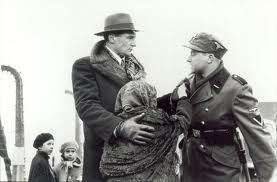 |
| Demanding the release of the children. |
Schindler's factory is non-productive, and he is losing even more money as he refuses to produce functioning weaponry for the German army. The treatment of the Jewish people has clearly driven him to loathe the entire German war effort, and he sabotages their efforts:
Stern: We've received an angry complaint from the Armaments Board. The artillery shells, tank shells, rocket casings, apparently all of them have failed quality-control tests...They're withholding payment.
Schindler: Sure, so would I, so would you. I wouldn't worry about it. We'll get it right one of these days.
Stern: There's a rumor you've been going around miscalibrating the machines. They could shut us down, send us back to Auschwitz.
Schindler: I'll call around, find out where we can buy shells, pass them off as ours.
Stern: I don't see the difference whether they're made here or somewhere else.
Schindler: You don't see a difference? I see a difference.
Stern: You'll lose a lot of money, that's the difference.
Schindler: Fewer shells will be made. Stern, if this factory ever produces a shell that can actually be fired, I'll be very unhappy.
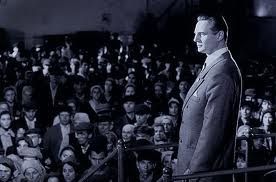 |
| Saying goodbye to his workers. |
His workers are not made to create the weapons that will be used against the cause of their people. He also encourages them to begin honoring the Sabbath again.
When the war ends, Schindler bids farewell to his grateful workers (they give him a ring made out of their own gold fillings, and they all sign a document saying that he helped them in case he is captured), and leaves to evade the Soviets, as he is a known "member of the Nazi Party...a munitions manufacturer...a profiteer of slave labor." He has no money left. But as he walks to his car, surrounded by the people whose lives he saved, all he can think of is that he could have done more:
Schindler: I could have got more out. I could have got more. I don't know. If I'd just...I could have got more.
Stern: Oskar, there are eleven hundred people who are alive because of you. Look at them.
Schindler: If I'd made more money... I threw away so much money. You have no idea. If I'd just...
Stern: There will be generations because of what you did.
Schindler: I didn't do enough!
Stern: You did so much.
Schindler: This car. Goeth would have bought this car. Why did I keep the car? Ten people right there. Ten people. Ten more people. This pin. Two people. This is gold. Two more people. He would have given me two for it, at least one. One more person. A person, Stern. For this. I could have gotten one more person...and I didn't! And I... I didn't!
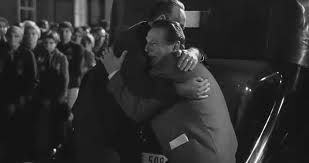 |
| Schindler breaking down as he prepares to depart. |
A powerful, epic movie. It's difficult to watch, and almost impossible to believe that these things could possibly have happened in such recent history. Oskar Schindler was a fascinating character to watch develop. Tyler and I found it difficult to believe that Liam Neeson had not won the Oscar for this role, until we saw that Tom Hanks had won for Philadelphia.
At the end, we see real shots of the people saved by Schindler, and their descendents, visiting his grave, and learn that there are more than 6,000 descendents of the workers he saved living around the world.
Emilie Schindler, Schindler's wife, said later that "Oskar had done nothing astounding before the war and been unexceptional since. He was fortunate, therefore, that in that short fierce era between 1939 and 1945 he had met people who summoned forth his deeper talents." I don't know how accurate this is, because she was likely bitter over his constant adultery. But I do understand that this was the great accomplishment of his life, and it was a great one. His words in the beginning turned out to be true, though not for the reasons he thought at the time: "They won't soon forget the name Schindler, either. I can tell you that. Oskar Schindler, they'll say. Everybody remembers him. He did something extraordinary."
Very good review my love. This is a hard movie to watch, especially when he wants to give water to the Jews on the train and the Nazis are getting annoyed with him for his basic human dignity. Good review my love.
ReplyDelete